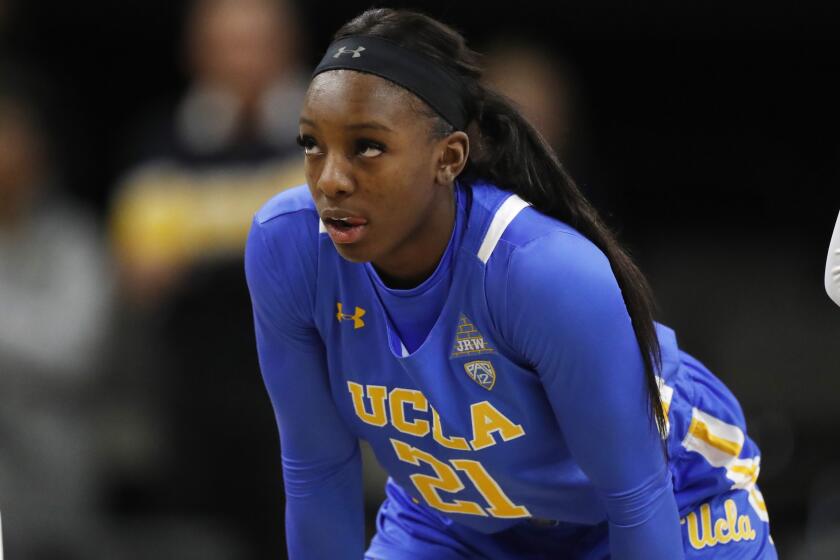Why UCLA’s Michaela Onyenwere is no longer silent on and off the court
- Share via
For two years at UCLA, people pronounced Michaela Onyenwere’s name as “On-yen-where.” It was listed as so in the media guide. The public address announcer called it out at Pauley Pavilion during starting lineups. Her coaches said it during interviews with reporters.
It wasn’t correct.
“Own-yen-way-day,” she clarified for ESPN’s Holly Rowe during an interview in March 2019.
The 6-foot forward had already earned her first All-Pac-12 honor and led the Bruins to their fourth consecutive NCAA regional semifinal before speaking up. She has not stopped using her voice since.
The moment proved to be a small precursor to the way her voice would grow at UCLA at a rate matched only by her skyrocketing talent.
Less than four years ago, Onyenwere arrived on campus as a quiet freshman planning to become a dentist. Now, she is a second-year captain and All-American candidate on the path to becoming a potential first-round pick in the WNBA, where she looks forward to strengthening her role as an advocate for social justice.
While Onyenwere’s on-court leadership has grown steadily, the sociology major’s motivation to amplify her voice outside of basketball was ignited by the George Floyd protests in 2020.
Coaches reminded Onyenwere and her teammates that speaking on social justice may be met with backlash, but players moved forward unapologetically while maintaining their high level of play.
The No. 9 Bruins are 7-2 overall and 5-2 in conference play after a 92-67 victory Sunday over visiting Utah. Onyenwere, who had 17 points and nine rebounds against the Utes, is averaging 18.7 points and 8.4 rebounds per game.
Michaela Onyenwere finishes with 33 points as the UCLA women’s basketball team ends Oregon’s 24-game Pac-12 winning streak in 73-71 victory.
“We’ve been silent for too long,” Onyenwere said the same day she was named Pac-12 player of the week for scoring a career-high 33 points in a road upset over Oregon last week. “At the end of the day, I knew what I wanted to do, we knew what we wanted to say, we knew what we wanted to accomplish.”
The stance is a “complete 180” for Onyenwere, head coach Cori Close said. The senior previously avoided optional team discussions about racial issues. She didn’t want to think about the news of yet another Black person dying. She didn’t want to rehash the pain another time.
Now, she is “one of the boldest, most courageous, most vulnerable, most active people” on the team, Close said.
Onyenwere, Lauryn Miller, Charisma Osborne and Camryn Brown organized UCLA’s “More than a D.R.E.A.M.” committee, which leads the team’s efforts to fight racism and educate others.. The group hosts conversations about race with prominent alumni during “Bruin Table Talk” discussions posted on YouTube. The players are planning events for Martin Luther King Day and Black History Month.
Onyenwere, who is one of 25 players on the midseason watch list for the John R. Wooden Award as the nation’s best player, works specifically on social media for “More than a D.R.E.A.M.” She always presents strong ideas during meetings, Osborne said, bringing a unique perspective as a daughter of Nigerian immigrants.
After years of working to strengthen Onyenwere’s vocal leadership, associate head coach Shannon Perry-LeBeauf said the nation’s racial reckoning “[brought] out what was in her that we were trying to pull out of her.”
Perry-LeBeauf leads UCLA’s specialized “Leaders in Training” group. Participation is voluntary for players who want to work on their leadership skills.
Onyenwere joined after her freshman year when Close met with the budding star and asked her to become the go-to player when the Bruins graduated stars Jordin Canada and Monique Billings. It wasn’t just a challenge for her to increase her skills on the court, but also step up among her teammates.
“It forced me to be uncomfortable,” Onyenwere said. “It was something that I didn’t want to do but obviously something that I needed at the time.”
What the Bruins needed was for Onyenwere to start talking. She always let people mispronounce her name since elementary school because it just seemed easier to shrug off the butchered attempts. She didn’t like talking in front of groups. Like she had done in the face of racist microaggressions when cheerleaders at her high school dressed freshman cheerleaders in black face for a hazing ritual, she didn’t point out mistakes, even if they bothered her.
Onyenwere is a good friend and teammate, Perry-LeBeauf said, and was worried about the impact criticizing her teammates’ performance would have on their relationships. The coach showed Onyenwere the importance of truth-telling in leadership.
“If you really love someone, you’ll tell them the truth,” Perry-LeBeauf said.
When Perry-LeBeauf sees Onyenwere getting frustrated in practice, the coach addresses her directly. She pauses and challenges her: What do you want to tell your teammates right now? Onyenwere doesn’t single teammates out, but often calls for more effort from everyone. Her teammates always listen.
“We all listen to Michaela because we respect her so much,” said Osborne, Onyenwere’s roommate. “So when she does say those things, we all take it to heart and try to change whatever she’s saying.”
“In terms of her being this star, she doesn’t see herself that way. It’s beautiful. It’s a breath of fresh air, but it’s also like Michaela, do you understand the impact and influence you have?”
— Shannon Perry-LeBeauf, UCLA associate coach
Onyenwere sets the foundation for her leadership with hard work. The three-time Colorado Gatorade player of the year is relentless in practice and games, where she is on track to lead the Bruins in scoring average and total rebounds for the third consecutive season despite battling tendinitis in her knees.
The nagging injury was likely brought on by the pandemic-interrupted offseason training schedule. The senior who has missed just one game of her college career doesn’t anticipate it will be a hindrance during her professional career, which could start as soon as this spring.
ESPN tabbed Onyenwere as the No. 7 overall pick in a WNBA mock draft in December. Her coaches hype her as a top-five selection. The unassuming Onyenwere, who could return next year with the NCAA’s forgiving eligibility rules during the pandemic, tries to brush off the praise.
It seems surreal to her. All she did was work on her game every summer, accepting new challenges from her coaches at the end of each season. She just wanted to help her team win.
“In terms of her being this star, she doesn’t see herself that way,” Perry-LeBeauf said. “It’s beautiful. It’s a breath of fresh air, but it’s also like Michaela, do you understand the impact and influence you have?”
Onyenwere is only beginning to answer that question. Instead of the negative reaction the coaching staff braced for, the team’s civic engagement has been met with support from donors and fans. One group of boosters even started their own book club around racial issues, and players visit to speak on occasion. In addition to working with the team’s social justice efforts, Onyenwere also is a founding member of UCLA’s Black Student-Athlete Alliance and advocates nationally through the Advancement of Blacks in Sports.
Entering the WNBA would be “such a privilege,” Onyenwere said of the league that flexed its civic muscle by championing the #SayHerName movement and helping to flip the U.S. Senate by backing Rev. Raphael Warnock in the Georgia runoff election.
Just like she learned with the Bruins, Onyenwere is now prepared to speak off the court and give people another reason to know the correct way to say her name.
More to Read
Go beyond the scoreboard
Get the latest on L.A.'s teams in the daily Sports Report newsletter.
You may occasionally receive promotional content from the Los Angeles Times.









